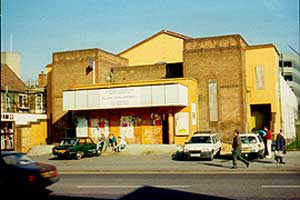

Bletchley's post-war development was progressing rapidly around the Whiteley Crescent and Newton Road area and, alongside this, the Saints estate with its population of London 'overspill' was growing.
Increasing numbers of young people were growing up in Bletchley and looking for a social life.
This prompted Barrie to think about education and the aspects of it with which he did not agree. The ex-grammar school pupils that he met at Cranfield appeared to have little in the way of practical and social skills, which concerned him, so he approached the local Education Officer about becoming officially involved with youth work. This led to Barrie becoming connected with Denbigh School. Although the school had yet to be built, meetings took place at what was then Wilton School. When Denbigh opened, meetings took place there 3 nights a week and, after 3 years, Bletchley Youth Club was established.
It took some time for a suitable site to be found for a permanent clubhouse, due to local opposition. The sixth site to be proposed was Derwent Drive on the Rivers estate in West Bletchley and this was the site on which the club was eventually built. During the 12 months preceding completion of the building, the club was based at the Labour Hall in Buckingham Road.
Tuesday night was 'disco night' and Saturday was the day on which football games took place. Other evenings saw groups of youngsters going to the Studio Cinema in Bletchley Road (now Queensway) and going on coach trips to pop concerts.
Barrie Field was the principal full-time worker, alongside Jim James - a man who gave great encouragement to youngsters who had an interest in music, drama and poetry. The club gave strong support to the arts, and poets and musicians would visit the club and give recitations to up to 200 teenagers. After Jim left, Mike Spencer - a drama teacher from Denbigh School - became a full-time worker. The club won the National Drama Festival in London and one of the people who took part - Albie Woodington - went on to become a professional actor, appearing some years later in the television series 'Cadfael'.

The atmosphere at the club was very good. In the early 1960's the club was featured in a BBC2 TV programme 'Working with Youth' which gave a good insight into how the Derwent Drive centre and its members maintained this atmosphere.
The London 'overspill' teenagers and their local Bletchley peers mixed very well together. The Londoners were generally more confident in their views, more up-to-date with music and fashion, and more worldly-wise than Bletchley teenagers. Local youngsters were more family orientated and used to a slower pace of life, but the two groups seemed to bring out the best in each other and there was very little disagreement.
After 12 years at Derwent Drive, Barrie Field decided to leave the centre and was approached to work with youth at the Water Eaton Church Centre. He also worked at Leon School and, through these jobs, was involved with the London 'overspill' of the Lakes Estate.
There are still youth groups running in Bletchley, but they are not as popular as they were in the 60's and 70's. Youth clubs at that time provided a social life for teenagers who did not have the many different forms of entertainment that today's teenagers have. They also provided support for young London incomers, enabling them to settle into Bletchley life.
